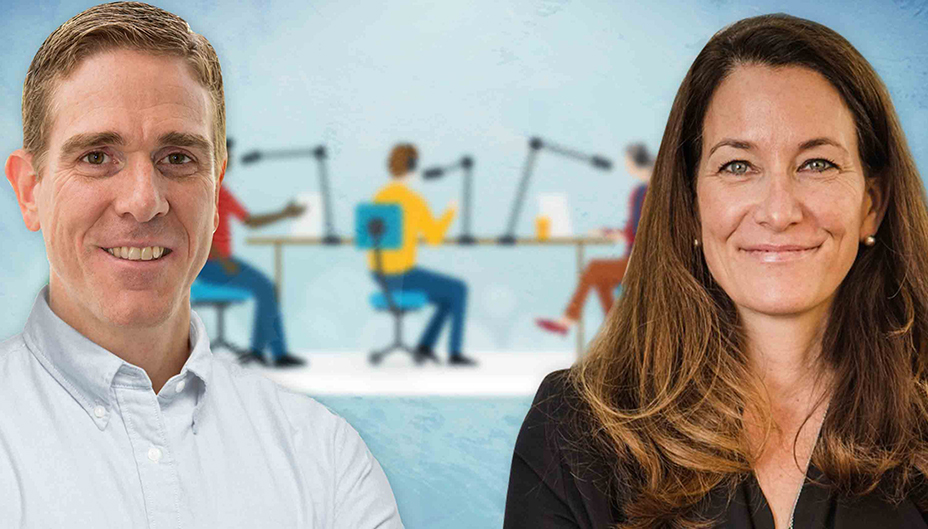How Innovation Could Transform Alberta's Economy
Written by John Stackhouse
Published on May 25, 2020
minute read
Share:
Alberta has always found a way to build a better and stronger economy out of a crisis, but it's never faced anything like this.
A global pandemic that has decimated demand for its biggest export. A price war launched by foreign countries. A growing movement to transform its production to help address climate change.
But where there are threats, there are also opportunities – for our best oil and gas producers to transform what they do and emerge as global leaders, while helping to build a new economy.
Alice Reimer and Marty Reed are two leading innovators in Western Canada. Reimer is the site lead for the Creative Destruction Lab in Calgary and co-founder of investment platform the51. Reed is the CEO of V.C. firm Evok Innovations backed by two of Canada's biggest oil companies, Cenovus and Suncor, as well as the B.C. Tech Alliance. They joined the RBC Disruptors podcast to share why this could be Alberta's and Canada's moment to “recreate imaginatively" for a post-COVID economy – to transform Bow Valley into Alberta's own Silicon Valley.
“We are not in a local race. We are in a global innovation race," said Reimer. “This is not about us being the best in Canada. This is about us competing on a global scale."
Reed imagines a bold future in which Alberta is truly a global energy sector titan – expanding beyond oil and gas – that could cultivate a trillion dollar energy-as-a-service company within a decade. To get there requires “a different lens and a different culture," one that embraces new ideas and invention models.
“That's the fundamental transition that needs to happen before we can see Calgary really embrace and start to accelerate into this new economy," he said.
Part of that is creating “smart policy" that will help create an environment in which successful companies, solutions and technologies can emerge and thrive. Take California, home of Silicon Valley and an ambition to be carbon neutral by 2045. Reed describes the state as being at the forefront of policy that has delivered outsized benefits for the innovation sector, such as the Buy Clean California Act or the California waiver that enables it to promote zero emission vehicles. This creates a favourable environment to attract leading edge technologies, like B.C.-based Svante's carbon-capture system, which is being explored for use in California industrial facilities.
“Right now, all of that work is being done in the U.S. and it would sure be nice to see some of that work being done here in Canada," Reed said.
Calgary is considered one of the top 15 cleantech hubs globally, and has not suffered from a shortage of ideas. But it hasn't yet scaled globally. Calgary had roughly the same number of tech deals last year as Kitchener-Waterloo — for less than a third of the money.
So what does Alberta, and Canada, need to do to move the dial?
1. Invest heavily in world-class higher education
“Great cities are built around great research universities," said Reimer. “It is not good enough for us to be a top university in Canada, we need to have top universities in the world and compete on a global stage."
Reed agreed. “I don't know that as a society, anyone has ever said, 'Boy, in hindsight, I wish we'd spent less on education.'"
2. Choose a few competitive advantages and double-down on them
We have a head start in carbon capture (see Svante) and abundant natural gas that we can decarbonize to produce hydrogen energy. Not to mention our leadership in artificial intelligence and machine learning. How do we own the global podium in these areas?
3. Attract the best and brightest from around the world through an ambitious immigration approach.
It's not just about scientists and researchers either. Alberta will need more entrepreneurs and investors from around the world and yes, from across the country.
4. Attract risk capital to fund emerging innovations and companies, and corporate capital to scale them globally.
“There's been a tremendous amount of wealth that's been created in the oil and gas business over the decades," said Reimer. “Many of the folks who have created that wealth are interested in helping to start and create and invest in these early stage companies that will help towards diversification."
Alberta will need a lot more capital to finance this ambition. Venture capital to take on the big risks that entrepreneurs love, government capital for the infrastructure to build on, and institutional and corporate capital to take ideas to a global scale.
To hear more from inspiring thought leaders, find the full RBC Disruptors Podcast on Apple Podcasts, Google Podcasts and SoundCloud.
RBC Direct Investing Inc. and Royal Bank of Canada are separate corporate entities which are affiliated. RBC Direct Investing Inc. is a wholly owned subsidiary of Royal Bank of Canada and is a Member of the Canadian Investment Regulatory Organization and the Canadian Investor Protection Fund. Royal Bank of Canada and certain of its issuers are related to RBC Direct Investing Inc. RBC Direct Investing Inc. does not provide investment advice or recommendations regarding the purchase or sale of any securities. Investors are responsible for their own investment decisions. RBC Direct Investing is a business name used by RBC Direct Investing Inc. ® / ™ Trademark(s) of Royal Bank of Canada. RBC and Royal Bank are registered trademarks of Royal Bank of Canada. Used under licence.
© Royal Bank of Canada 2025.
Any information, opinions or views provided in this document, including hyperlinks to the RBC Direct Investing Inc. website or the websites of its affiliates or third parties, are for your general information only, and are not intended to provide legal, investment, financial, accounting, tax or other professional advice. While information presented is believed to be factual and current, its accuracy is not guaranteed and it should not be regarded as a complete analysis of the subjects discussed. All expressions of opinion reflect the judgment of the author(s) as of the date of publication and are subject to change. No endorsement of any third parties or their advice, opinions, information, products or services is expressly given or implied by RBC Direct Investing Inc. or its affiliates. You should consult with your advisor before taking any action based upon the information contained in this document.
Furthermore, the products, services and securities referred to in this publication are only available in Canada and other jurisdictions where they may be legally offered for sale. Information available on the RBC Direct Investing website is intended for access by residents of Canada only, and should not be accessed from any jurisdiction outside Canada.
Explore More

Here’s What Every Canadian Should Know About Estate Planning
Insights from Leanne Kaufman to help you feel more confident as you plan
minute read

3 Things We're Watching This Week
What the Inspired Investor team is watching
minute read

What’s Driving the Recent Surge in Gold Prices
Here are some things to watch with the gold market
minute read
Inspired Investor brings you personal stories, timely information and expert insights to empower your investment decisions. Visit About Us to find out more.







